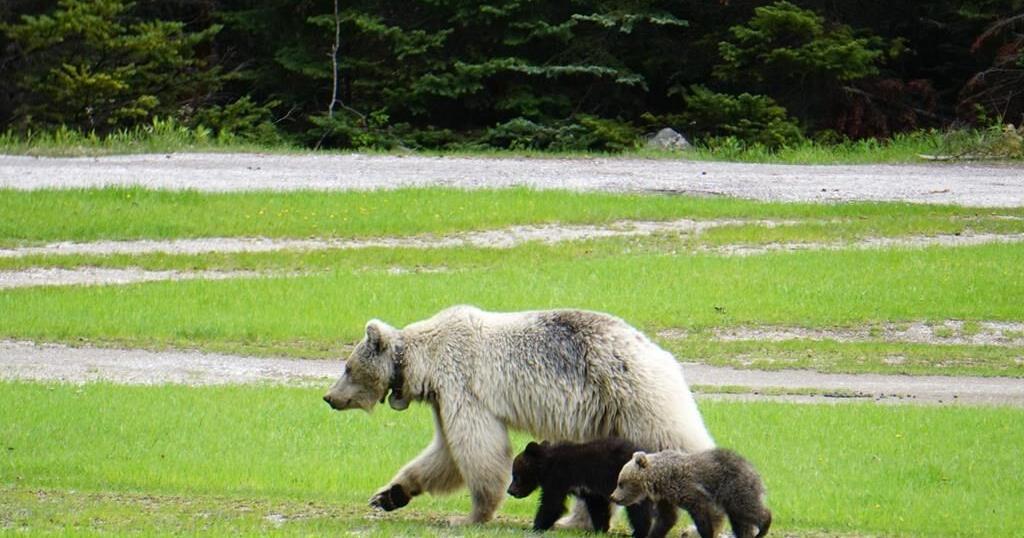FIELD, BRITISH COLUMBIA, CANADA – In the spring of 2023, a Parks Canada team strung electric fence along a section of the Trans Canada Highway from Lake Louise to the B.C.-Alberta boundary.
It was part of an attempt to help keep animals including a beloved white grizzly bear named Nakoda away from the dangers of the road. But tragedy struck last month when Nakoda’s two cubs were struck and killed by a vehicle, followed by their mother, killed in a second collision about 12 hours later.
The deaths in British Columbia’s Yoho National Park near the provincial boundary highlight the ongoing effort to spare large animals from peril on the highways, as well as its limitations. Parks Canada and a private group are pushing for more and better maintained electric fencing along highways and private property, particularly as interactions between bears and human activity increase.
Parks Canada spokeswoman Saundi Stevens said installing an electric fence was only part of the battle.
“If you look through the length of the Trans Canada fence from the east park boundary through Yoho, it’s 100 kilometres of fence and so you try to imagine what that takes to keep an electric wire functioning,” she said.
A fallen tree could take out a fence, she said, and there were “leaky spots” involving culverts and wildlife overpasses and underpasses, she said.
In the case of Nakoda, it was believed she had found one such section of unpowered fence to clamber through. “(She) was kind of getting up over the fence in this two-foot section that didn’t have a hot electric wire on it,” Stevens said, adding that Nakoda was “a very smart bear” who was fond of eating roadside vegetation.
“We do the best we can, but there’s always times (when) a tree falls and until we can get out there and inspect the fence … there may be a period of time when the fence or the electric wire is deficient,” said Stevens.
Stevens said Parks Canada is now having conversations with highway engineers about improving electric fencing on highways after the June 6 collisions that killed Nakoda and her cubs.
Wildlife management staff from Parks Canada were in the area repairing the fencing when the bears were killed.
“The electric fence works, but I think where we need to stay on top is just doing fence repairs and keeping the highway fence in good shape every spring and doing the maintenance … before bears come out,” said Stevens, adding that Parks Canada is taking the issue seriously.
One of the challenges is that crew can’t get out until the snow pile melts, by which time bears are already emerging from dens, Stevens said.
Parks Canada said about $50,000 was allocated annually for fence repairs in the Lake Louise, Yoho and Kootenay Field Unit, an area including Yoho National Park and the border area.
It’s not just parks officials who worry about the sometimes deadly interface between bears and humans.
A beekeeper for more than 30 years, Gillian Sanders from the North Kootenay Lake area said bears visit her property every year. She started using electric fencing in 1997 with the goal of making better neighbours of the black and grizzly bears.
Sanders is the founder of Grizzly Bear Coexistence Solutions, a project that promotes a better relationship between grizzlies and rural residents in the Columbia Region. It advocates for electric fencing on private properties and has been involved with the installation of more than 525 electric fences in the Kootenay region to reduce conflicts with bears.
It provides 50-per-cent cost sharing for electric fencing to protect livestock or crops from bears.
Sanders said she found bears to be “very respectful” and easygoing neighbors, as long as they are not presented with food.
Sanders said electric fencing is more important than ever since grizzly bears started showing up in low-elevation habitats where they have never been seen before.
“We want to enable the bears to move through valley bottoms and utilize those low-elevation habitats without coming into conflict with people,” said Sanders.
She said electric fencing wasn’t just of benefit to the bears — residents enjoyed seeing bears near their properties without the risk of conflict that typically resulted in the deaths of the animals.
“It’s a real shame if bears end up dying for preventable causes,” said Sanders.
“It’s quite easy to coexist with bears when you have the tools to deter them from the areas we don’t want them to be.”
Although it has been a month since the deaths of Nakoda and her cubs, Stevens said the loss was still “incredibly difficult” for parks staff, especially those who spent “hundreds and hundreds of hours” monitoring Nakoda, who she described as a “super special” bear.
She said Nakoda had developed a “certain level of tolerance around people” and had learned how to climb the fence, which she did frequently. “Our staff worked really hard to try and teach her not to. So they were constantly kind of hazing her, pushing her back over the fence. But she never really learned,” she said.
“When something like this happens, it has an impact on everybody,” said Stevens. “It’s super unfortunate.”
— By Nono Shen in Vancouver
This report by The Canadian Press was first published July 7, 2024.

























